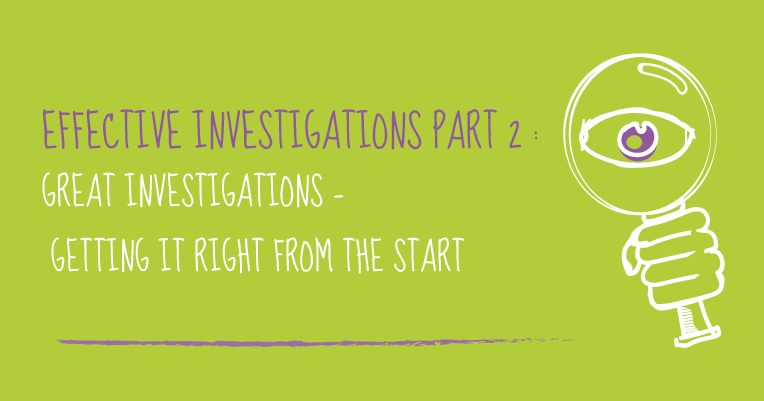In Part 1 of this blog series, we looked at the pitfalls of investigations and what happens when things go wrong. In Part 2, Becky discusses how we can put that into practice.

By Becky Mee
The purpose of an investigation is to:
Without this information, your decision might not be considering all the important facts.
1. Act in a timely manner
As soon as the issue is brought your attention, you should start to investigate as quickly as possible. Any delay could mean information is lost, people forget what has happened or the process could be prejudiced in some way. If you wait too long, the issue could be viewed as not important enough and this could be questioned at appeal or by a tribunal.
2. Investigate the facts
Someone needs to lead the investigation and they need to be available to complete the whole investigation. Ideally this would be the manager of the person concerned and shouldn’t be the same person who will hear the disciplinary; however, in small businesses this isn’t always possible. Try to avoid a conflict of interest where possible.
3. Suspend or not to suspend?
Depending on the situation and the severity of the issue, you may need to suspend the employee whilst you investigate what has happened. This is often the case where you suspect the employee’s actions are gross misconduct. Suspension shouldn’t be an automatic response – it should be appropriate and to protect the investigation process. Always back it up in writing and let the employee know:
4. Links in the chain
You will need to decide who you need to talk to and what information you need to gather as part of your investigation. Look at the situation overall and ask yourself:
You will then need to investigate these in turn.
5. Invite to investigation
You will need to invite the accused and potential witnesses to an investigation meeting, so you can ask them questions and fact find. You don’t need to invite them in with notice and they don’t have a right to representation at this stage. However, if your disciplinary policy says that you will invite with notice and in writing, you’ll need to follow it! Make sure you have your questions written down and think around the situation; make sure you are asking “what, where, when, how” questions to get the full picture.
6. Take statements
During the investigation meeting make notes, and if needs be, ask the person for a witness statement which is either written or typed by them. Bear in mind, any statements or investigation meeting notes can be shared with other people prior to a disciplinary hearing so statements need to be factual, accurate, clear and the employee should be aware that they will be shared. If they are not comfortable with this, you may need to anonymise the statement.
7. Gather other evidence
If there is other evidence that is relevant, you need to capture this now. This could include CCTV, computer records, relevant documents, emails, online chat, key logs, sign in sheets etc. Make sure you have as many bases covered as possible.
8. Presenting the evidence
As the evidence will need to be shared with the employee as part of the disciplinary process, make sure notes are neat, typed where possible and the evidence is referenced.
Do you need help with an investigation? Not sure what to do? HR180 can help with one to one coaching or bespoke training. Give us a call today!
Leeds based HR180 is a team of superheroes in HR Outsourcing, Projects and Consultancy committed to work in partnership with organisations of all sizes to establish working policies to go above and beyond Employment Law requirements, to protect both employees and employers alike. We love to hear from you, so call us on 0113 287 8150 or hit the Rescue Me button.
You can filter through our news using the tags below, just select one and off you go!


We’ll fly to your aid for any HR reason (and some non HR ones!)
